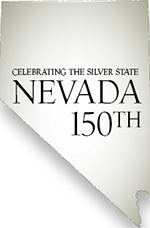Popular ’20s singer tuned out by Nevada voters
Editor’s Note: Nevada 150 is a yearlong series highlighting the people, places and things that make up the history of the state.
CARSON CITY — Four years before Hollywood actor Ronald Reagan became California governor, Nevada had its own celebrity who tried to cash in on his name to become governor in his adopted state.
He failed miserably. Gov. Grant Sawyer beat singer Gene Austin in the 1962 Democratic Party primary by a vote of 8 to 1.
The name Gene Austin is forgotten today by just about everyone except old 78 record collectors. But Austin’s songs remain American classics.
He was the most popular singer in America in the 1920s. Austin (1900-72) sold 80 million records and popularized sappy little love songs like “My Blue Heaven,” “Bye Bye Blackbird,” “When My Sugar Walked Down the Street” and “Ramona.” Austin wrote the lyrics to many of his songs. Billboard would call him “the Elvis Presley of the 1920s.”
But the old crooner didn’t scare Sawyer, then a former Elko lawyer running for his second term as governor.
A resident of Las Vegas since 1941, Austin had had it with Nevada politics. He was shocked by the poverty he saw in Nevada, a state that he believed potentially was the richest in the nation because of its gold and silver deposits. There needed to be a share-the-wealth philosophy in Nevada, he believed.
So Austin ran for governor on a platform that included giving a monthly $100 check to every senior citizen in Nevada, paying for a college education for every qualified school kid, creating a Veterans Administration hospital in Las Vegas and establishing a state sweepstakes pool on boat races in Lake Mead. A $100 check in 1962 would be worth $775 today.
“Nevada is like a bank, a super bank loaded with more wealth than any bank on earth,” said Austin in his campaign advertising.
Nevada also could become a garden of Eden,” he said, by bringing its water supplies to the surface and growing fruit.
He told the New York Post during his campaign that “campaigning is nothing new to me, after all, it is just show business.”
The Review-Journal endorsed Sawyer and dismissed Austin and two other Democratic gubernatorial candidates as lacking seriousness.
In today’s political world, no one blinks an eye when a celebrity runs for office. In Austin’s era, it still was rare.
Actor George Murphy became a U.S. senator from California in 1964, Reagan followed with his gubernatorial victory in 1966. Clint Eastwood would become the mayor of Carmel, Calif., in the 1980s and wrestler Jesse Ventura became governor of Minnesota in 1998.
The first celebrity to win a major office may have been Louisiana Gov. Jimmie Davis in 1944. He banked his singing of “You Are My Sunshine” into a two-term career as governor.
Nevada’s first celebrity politician was former B western cowboy actor Rex Bell, elected lieutenant governor in 1954 and 1958. Bell also ran unsuccessfully in 1944 for the House of Representatives. His biggest fame, however, may have been his marriage to Clara Bow, perhaps the biggest star in the silent movie era.
Like Davis, Texas-born Austin grew up in Louisiana. In his autobiography at Sam Houston State University, he described his arrival in Louisiana.
“To me it seemed my adventurous days were over because the area was infested with snakes and alligators, creatures I didn’t like, and there were bogs, quagmires and quicksand.”
At age 17, he joined the Army and was stationed in New Orleans where he played piano at night in brothels.
His stepfather (Austin took his stepfather’s last name) had been a blacksmith and taught him all about horses. So the Army sent him to Mexico as part of Gen. John Pershing’s cavalry expedition to capture Pancho Villa. When that expedition ended without success, he was sent to France and World War I.
By 1924, his “When My Sugar Walks Down the Street” made him a singing star. “My Blue Heaven” in 1928 sold 5 million copies and topped the charts for 13 straight records. “Ramona” followed at No. 1 for five weeks. The Beatles’ “She Loves You” ranked No. 1 for five weeks in 1964.
More than two dozen movies have featured Austin singing, the most recent was the acclaimed “Green Mile” whose soundtrack included him singing “Have You Ever Seen a Dream Walking?”
His singing must have had an effect on the opposite sex — Austin would marry five times. One of his wives, Doris Sherrell, starred in 1944’s forgotten “Moon over Las Vegas.” Imagine a movie about Las Vegas without a Strip?
And one of his children, Charlotte Austin, became a Hollywood glamour girl in the 1950s and starred in camp classics like director Ed Wood’s “The Bride and the Beast.”
Austin himself tried movies, even westerns. But unlike his contemporary, Bing Crosby, he never made it as a romantic screen idol.
Unfortunately, Austin looked more like a pudgy Matt Damon instead of Clark Gable. And by the late 1930s, he no longer was churning out hit after hit.
In 1941, he settled in the little desert town of Las Vegas where he could make a good living singing his old favorites to crowds gathered in the new gaming hotels. From Las Vegas he could fly to the engagements he lined up in clubs around the county.
His career revived nationally in 1957 when a biography of his life appeared on television. So he would have been well-known at the time of his race for governor.
He died of cancer in a hospital in Palm Springs at age 71 on Jan. 24, 1972.
Contact Capital Bureau Chief Ed Vogel at evogel@reviewjournal.com or 775-687-3900.























